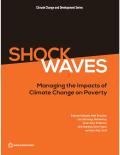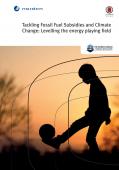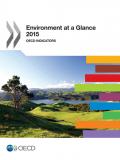This report provides a new detailed quantitative assessment of the consequences of climate change on economic growth through to 2060 and beyond. It focuses on how climate change affects different drivers of growth, including labour productivity and capital supply, in different sectors across the world. The sectoral and regional analysis shows that while the impacts of climate change spread across all sectors and all regions, the largest negative consequences are projected to be found in the health and agricultural sectors, with damages especially strong in Africa and Asia.
This year, for the first time ever, nearly all of the world’s countries are making pledges to help limit future climate change. As of 1 October 2015, 147 countries (representing about 85% of global emissions) have submitted their Intended Nationally Determined Contributions. These pledges, if carried out in full, are expected to lower emissions relative to the ‘business as usual’ forecast. However, they are not expected to prevent emissions from increasing above today’s level through 2030. To meet the global goal of limiting mean global temperature change to 2°C relative to the pre-industrial level, much more will need to be done after 2030. Eventually, emissions will have to fall to zero worldwide – either that, or countries will need to remove carbon dioxide directly from the atmosphere. This new Vox eBook looks into what needs to be done to build a climate regime that is both workable and effective.

Climate change and climate policies will affect poverty reduction efforts through direct and immediate impacts on the poor and by affecting factors that condition poverty reduction, such as economic growth. This report explores the relation between climate change, climate policies, and poverty outcomes by examining three questions: the (static) impact on poor people's livelihood and well-being; the impact on the risk for non-poor individuals to fall into poverty; and the impact on the ability of poor people to escape poverty. The report explores various channels through which climate change and policies will affect poverty: economic impacts through incomes and prices; natural disasters and their effects on assets and livelihoods; and health impacts. It also investigates policy options to ensure adaptation and mitigation policies -- such as adaptive and well-targeted social protection, public investments, and financial inclusion policies -- contribute to poverty reduction and protect poor people against climate change impacts.

This report presents a model that analyses fossil fuel subsidy reform across 20 countries showing an average reduction in national GHG emissions of 11% by 2020, and average annual government savings of USD 93 per tonne of CO2 abated. With a modest recycling of resources to renewables and energy efficiency, emissions reductions can be improved to an average of 18%. Some countries have included reforms in Intended Nationally Determined Contributions, toward a climate agreement. The report presents case studies from Morocco, Philippines and Jordan and was authored by the Global Subsidies Initiative of IISD, as part of the Nordic Prime Ministers’ green growth initiative.

Environment at a Glance 2015 updates key environmental indicators and relevant socio-economic and sectoral indicators to track OECD country progress on major environmental issues and inform policy development and evaluation. This year's edition includes increased coverage of environmentally related taxation, ODA and R&D expenditure.
